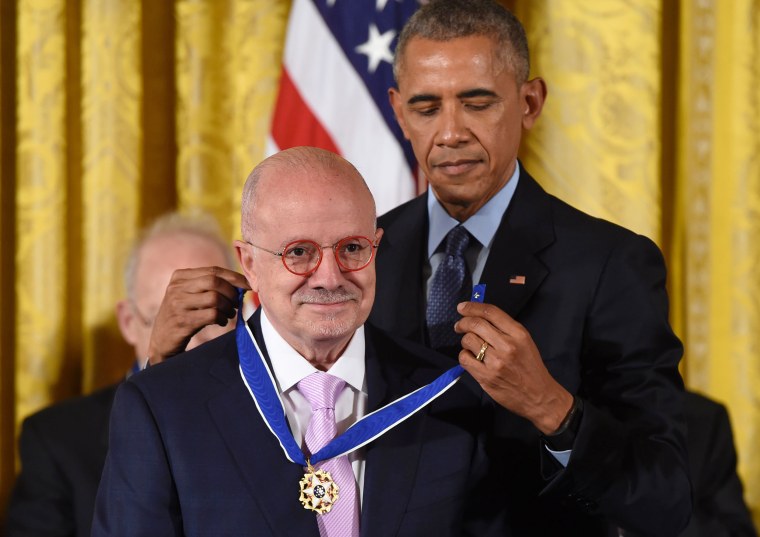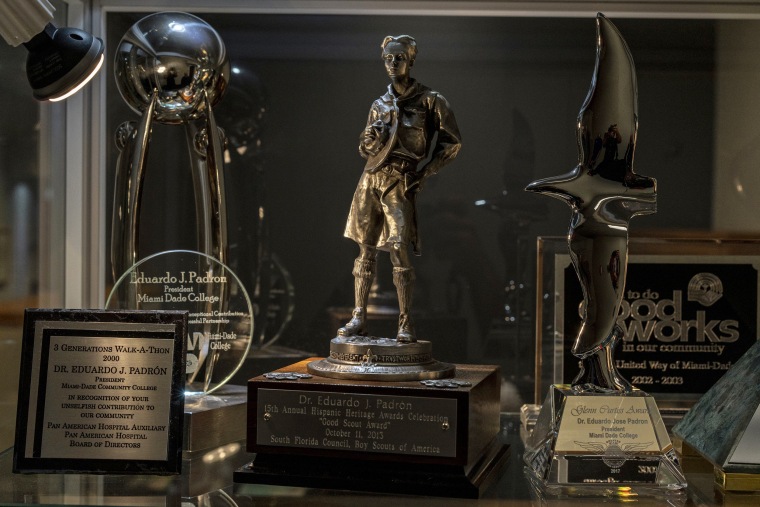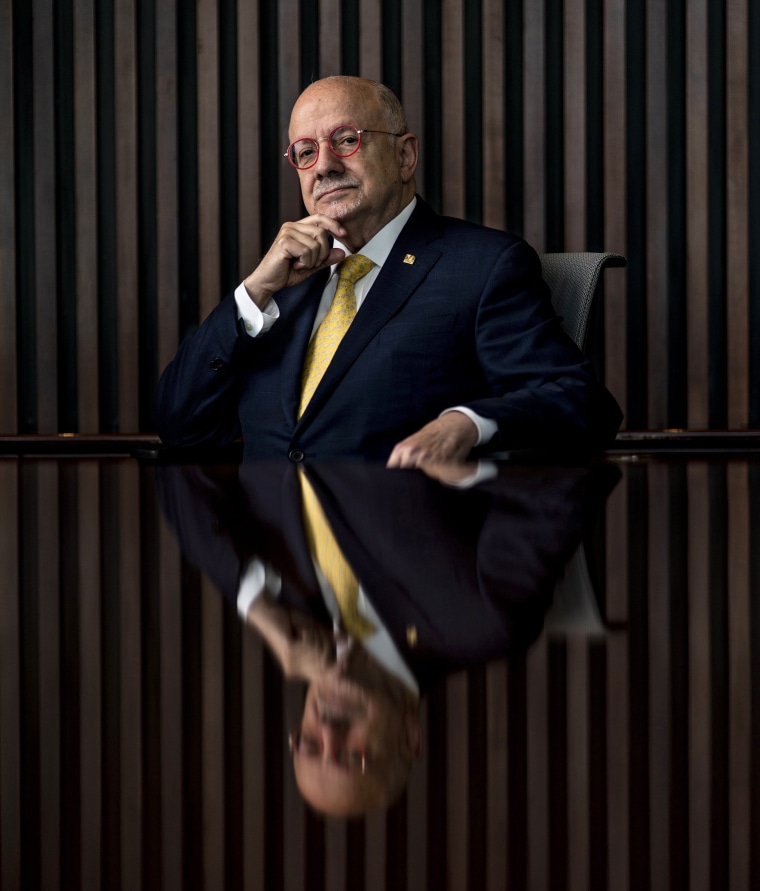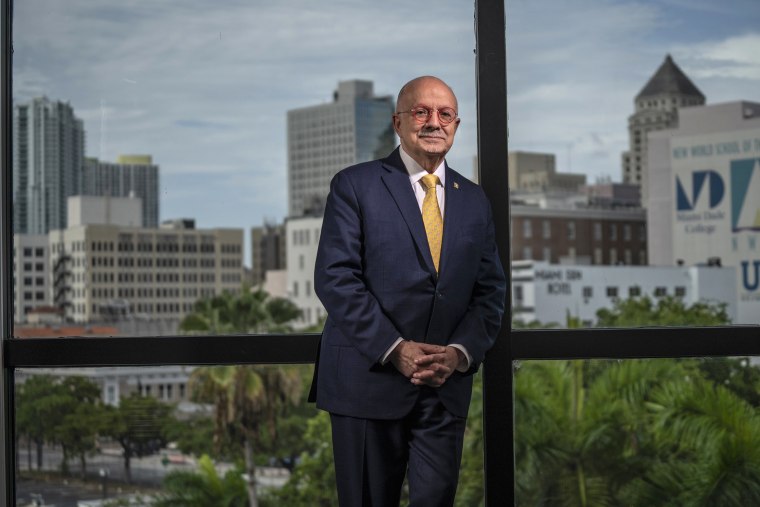MIAMI — Eduardo Padrón left his hometown, Marianao, a hard-scrabble municipality in Havana, with nothing but the clothes he was wearing. He was 16, the son of a marketing director for a pharmaceutical company who was with his younger brother on a night flight to Miami. It was 1961.
He and his brother, Ernesto, nearly 13, had only learned they were leaving the day before. Their parents, desperate to get the boys out of Cuba, had planned their departure for months but kept it secret for fear the Castro government would find out and not allow them to leave.
“It was a nightmare," Padrón recalls. "I cried all night. I thought, what’s going to happen to me? I don’t know English. I don’t know anybody.”
He had no time to say goodbye to his friends or relatives. But his parents promised that they would all be reunited soon and that someone would welcome the boys at the Miami airport.
Nothing went as expected, and no one was waiting for them. But a woman named Rosa, who had been waiting for a niece who didn’t show up on the same Operation Peter Pan flight, noticed them and realized they were the Padrón children — she knew the family in Cuba — and offered to take them home.
“That’s where my journey began,” Padrón says.
Today, Padrón, 75, is among the nation’s most respected leaders of higher education and a cultural powerhouse in Miami. He steps down this month after nearly 25 years as president of Miami Dade College, the nation’s largest and most diverse public institution for higher learning.
In his early years in Miami, he supported himself and his brother working two and three jobs, cleaning toilets, picking tomatoes in the heat of summer, “whatever we had to do to survive.” He remembers seeing signs that said, “No blacks, no Cubans, no dogs,” and separate water fountains, and that “certain people” were forced to sit in the back of the bus.
“I lived that," he said. "I didn’t read it in books.”
Over his 50 years at the college, Padrón has transformed a small school into an eight-campus college with an enrollment of 165,000 students and more than 2 million alumni. It enrolls more minority students than any other U.S. college, including the most Latino students, and has trained many of Miami’s leading political, business, arts and civic figures.
“I’m a strong believer that talent is universal. However, opportunity is not universal," Padrón, who has a Ph.D. in economics, said. "And when you open the door of opportunity wide for the talent to be harnessed, some wonderful things happen. That’s what Miami Dade College has proven."

The larger world has taken notice. In 2016, President Barack Obama awarded Padrón the Presidential Medal of Freedom, the nation's highest civilian honor. Padrón is on the board of the Council on Foreign Relations, was the first Hispanic to lead the Association of American Colleges and Universities and was named one of Time’s top 10 best college presidents in the country in 2009. Awards, trophies and prizes fill shelves along a glass-enclosed wall on the corridor leading to his office.
Padrón joined Miami Dade in 1970, became president of the Wolfson campus downtown in 1980 and president of the entire college in 1995. He says he will continue to work to advance his principal mission — making affordable higher education available to all — and will remain involved in some way with the college.
“This is my life. I cannot abandon my life," he said. "I’ve been deeply rooted here for more than half a century."
A cultural imprint on his beloved city
In his trademark round red-rimmed glasses, clipped gray mustache, and buttoned-up jacket and tie, Padrón casts a professorial air in laid-back Miami, his name and face attached to some of the city’s most prominent establishments: the Miami Book Fair, the Miami Film Festival, the Freedom Tower and the Wolfson Archives.
“He tried to revive downtown Miami when it was moribund and laid out the plans for the book fair. His influence is so vast that he cannot be defined by one or two anecdotes,” said Mitchell Kaplan, the owner of Books & Books and a co-founder of the book fair. He's known Padrón since the early 1980s when Kaplan was 27 and starting out with a bookstore in Coral Gables. “I think that the word ‘impossible’ is not in his vocabulary.”
Padrón makes a point that he did not start the book fair because of his love of literature. “I was president of a college in downtown Miami when downtown was such a horrible sight that people did not want to come here. I was desperate to revive it.”
In the fall of 1984, Padrón, Kaplan and a handful of allies inaugurated the Miami Book Fair. He drew up the plans, locating it inside his own Wolfson Campus downtown. To everyone’s surprise, it was a success from the start, drawing major writers like James Baldwin and thousands of visitors. Over its 35 years it became the largest and most celebrated literary gathering in the nation.
It did everything Padrón intended. It transformed downtown Miami. It brought national attention to Miami Dade College and, by extension, to Padrón.

The book fair’s international success paved the way for an era of explosive growth in the arts and culture in Miami, with Art Basel coming in 2002, giving the city a world-class image.
“Without the book fair, Art Basel wouldn’t have come to Miami," says Alberto Ibarguen, chief executive and president of the Knight Foundation, a premier sponsor of the book fair.
Padrón also took the sagging Miami Film Festival under his wing, and turned the legendary Freedom Tower, a federal center for Cuban immigrants in 1960-62, where he once received assistance, into an MDC arts museum.
“Some people want to bowl you over. He wants to persuade you. He may not be schooled in advertising and publicity, but he is one of the most astute marketers and promoters I’ve seen,” Ibarguen said.
"A game of chess" he's won
Padrón’s decision to step down did not surprise his friends. “There were some signs of frustration,’’ Ibarguen said. “He’s tired of fighting Tallahassee.”
The Republican Legislature there controls the college’s budget and often Padrón, a Democrat, had to plead his case for more money.
“The toughest and constant challenge is finding the resources to provide the learning experience to students who would otherwise not have the opportunity to achieve the American dream,’’ he said. “I always have to fight for people to understand that quality doesn’t come cheap."

He insists he's had good relations with legislators, except for one incident when he clashed with Rep. Jose Oliva, a Republican and a millionaire tobacco grower from Miami Lakes, over a proposed sales tax to help college construction projects in the state. In an interview, Padrón called Oliva "a college dropout" (Oliva had left as a freshman to start his company). Padrón later apologized for letting a political dispute get personal.
“It was an isolated incident,” Padrón says. “I have had wonderful relations with Tallahassee in many ways.”
There have been other hurdles, however brief.
Shortly after he became president of Miami Dade, he mounted a campaign to transform the then-community college into a four-year institution. Some of the city and state's university administrators and academicians, who looked down on the school, opposed Padrón’s proposal. But Padrón prevailed and the change was approved by the Florida Legislature and the State Board of Education by the end of 2002.
Over a decade ago Padrón took advantage of a loophole in a state retirement program that allowed some state employees to retire and collect benefits while returning to their previous jobs at full salary. Padrón retired in 2006 and reportedly collected a lump sum of $893,286 in retirement benefits and began receiving $14,631 monthly in retirement pay. A month later he returned to the presidency at MDC. His salary at the time, according to The St. Petersburg Times, was just under $500,000 a year.
“All legal,” Padrón said. “At the time I selected this option, the legislation allowed me and other plan participants to be retained in the job after a 24-hour hiatus.”
In 2013, a Governor’s Office study reported that Padrón was making $630,000, making him the highest-paid college president in the Florida system. He declined to answer questions about his salary.
Padrón's — and Miami's — arc of success
“You don’t build what he did without determination and salesmanship,” said Jonathan Plutzik, a former Wall Street executive who owns the Betsy Hotel in South Beach with his wife, financier Lesley Goldwasser.
Plutzik, who is chair of Fannie Mae's board of directors, has known Padrón since he arrived 15 years ago from New York City, and they’ve often shared common interests in the arts, education and the city itself.
“Somehow Padrón was able to go from Point A to Point B to Point C successfully, without being distracted by the chaos, the back-and-forth, under all of it," Plutzik said. "It was a game of chess, and he has won.”
Padrón’s span in the city matches the arc of modern Miami — from the Cuban revolution that sent waves of Cuban exiles since 1960 to today, more than half a century later. He can measure the transformation in Miami and the path his life has taken.
“My mother only completed a third-grade education. Yet she was the wisest woman I’ve ever met," Padrón said. "My father barely completed high school, but they subscribed to two different newspapers and there were books all over the house for me to read. Every night before going to bed, they would read to me.”
When his mother, Delia, said goodbye to Padrón in Cuba, she pleaded with him to go to college in the U.S., "even if you go hungry to bed," telling him it was the only way he would make it.
He almost didn’t. A college counselor advised him to apply to a trade school, but instead he applied to more than a dozen colleges, including some Ivy Leagues. He was rejected by all — except Miami-Dade Community College, a modest school with 1,428 students on a campus north of the city. He later attended Florida Atlantic University, where he received his Bachelor's degree.
“My ideal from the time I arrived in Miami was to be very wealthy," he said. With that in mind he received a master’s and a doctorate in economics from the University of Florida, followed by an offer from DuPont, in Delaware, then the nation’s largest corporation. He wanted the job but professors at Miami Dade Community College asked him to teach there for a year to pay back his education. Padrón agreed and never left.
Years later he brought his parents to Miami. They had left Cuba and gone to Colombia, where his father, Eduardo, worked for the same company that had employed him in Cuba. When they retired, Padrón bought an apartment for them in Little Havana.
“Every day when I thank God, I thank him for my parents and the courage they had to give me a chance to have a better life,” he said.
One afternoon in June, after talking for hours in his office, he moved the interview to his house in a tree-covered neighborhood of single-family homes west of Brickell, the city’s center. His house, set back from the street, has a bright yellow façade and a terra-cotta roof, typical of the Mediterranean-Spanish style of the city’s well-off areas.
The house, with an indoor courtyard, a tiled hall and contemporary Latin American art that Padrón collects, reflects his old-world formality, his love of art, books and order. Nothing seemed out of place.
In the living room, his son, Camilo Ernesto, 50, and his grandson, Camilo Eduardo, 24, were waiting. Before taking a seat, Padrón, who was divorced in 1974, offered coffee, water or tea.
Camilo, an entrepreneur in the technology field, picked up the conversation about growing up Cuban in 1970s Miami, including having his private school classmates make fun of him over his Hispanic name.
Now, he's a big Miami booster. “It’s a great, fun global city," he said. "We’ve got great sports, the bay, the beach, restaurants. We’re open to everything. There’s not a city in the U.S. more open than Miami.”
Padrón, still wearing his jacket and tie, smiled. It's his town. He had said earlier that when Cubans first came to Miami, they “realized they had to build a city for themselves.”
That's what he's done.
Follow NBC Latino on Facebook, Twitter and Instagram.
